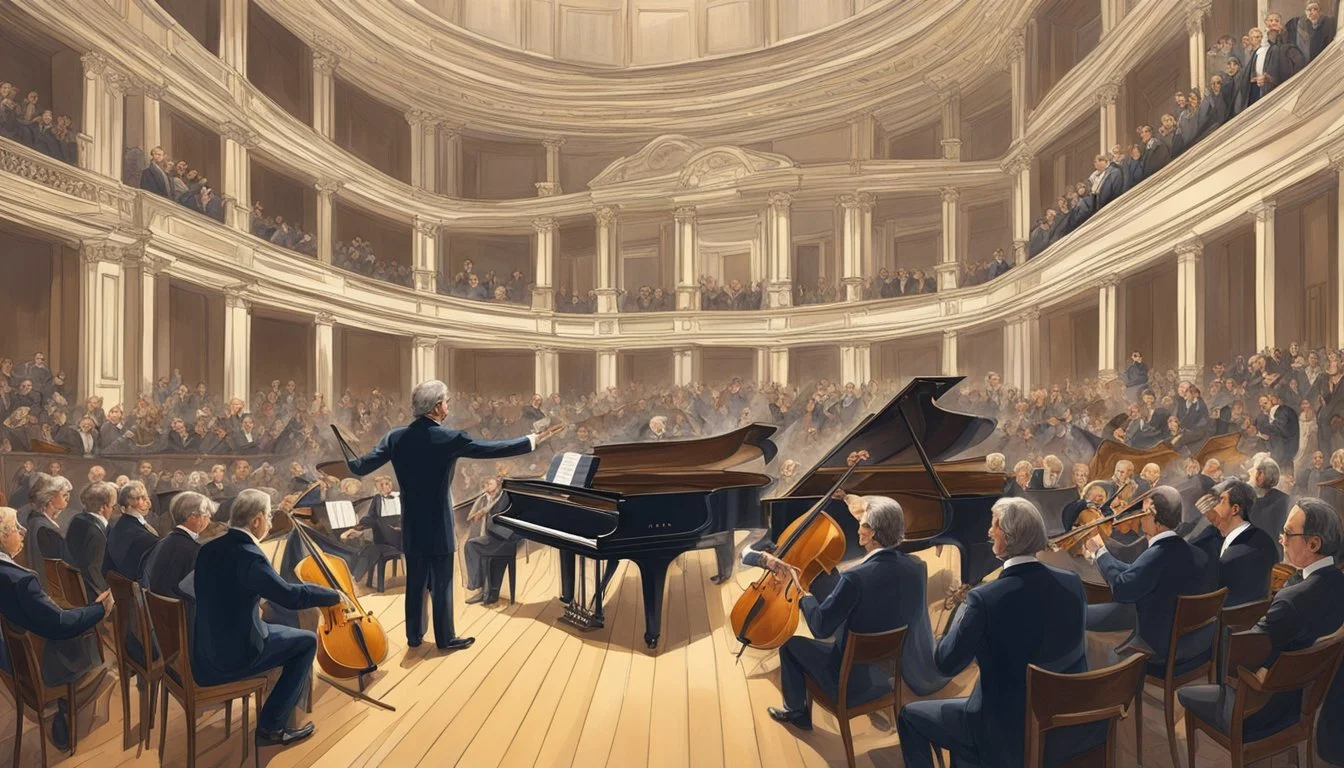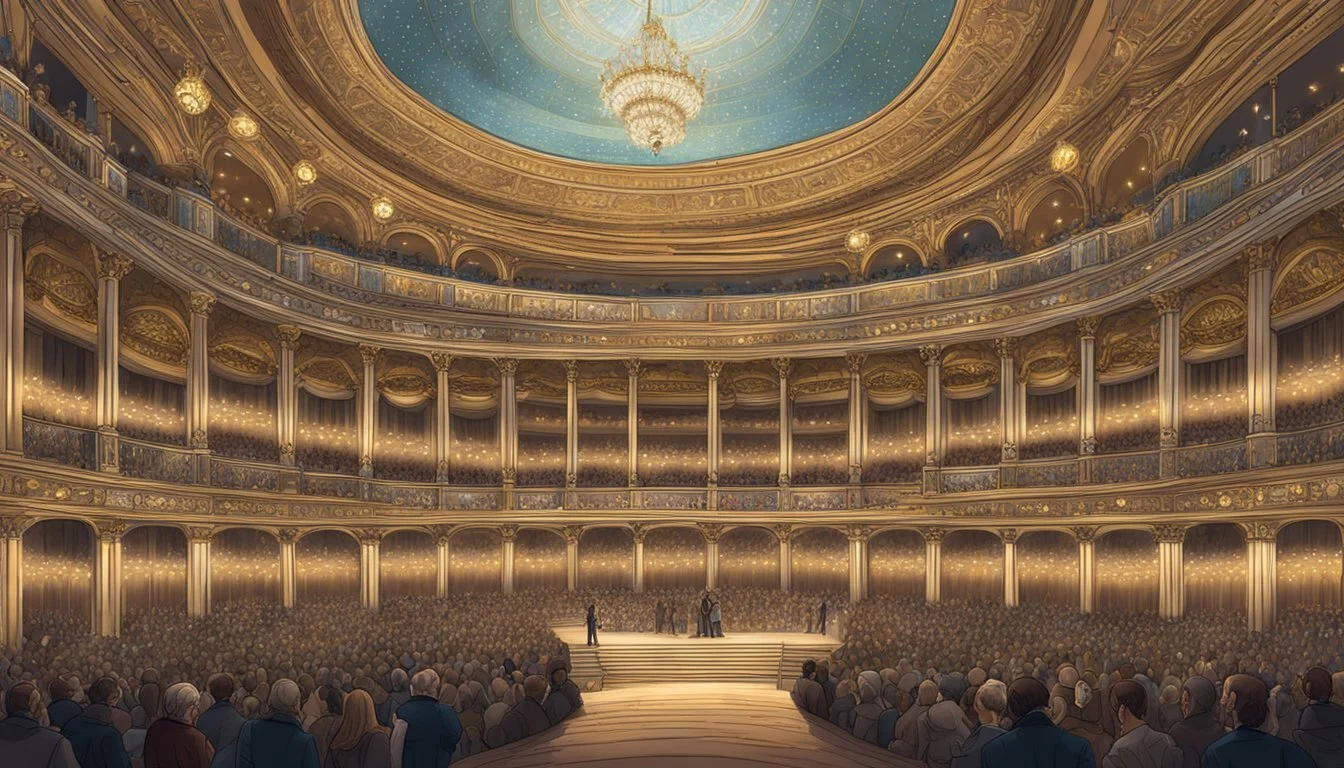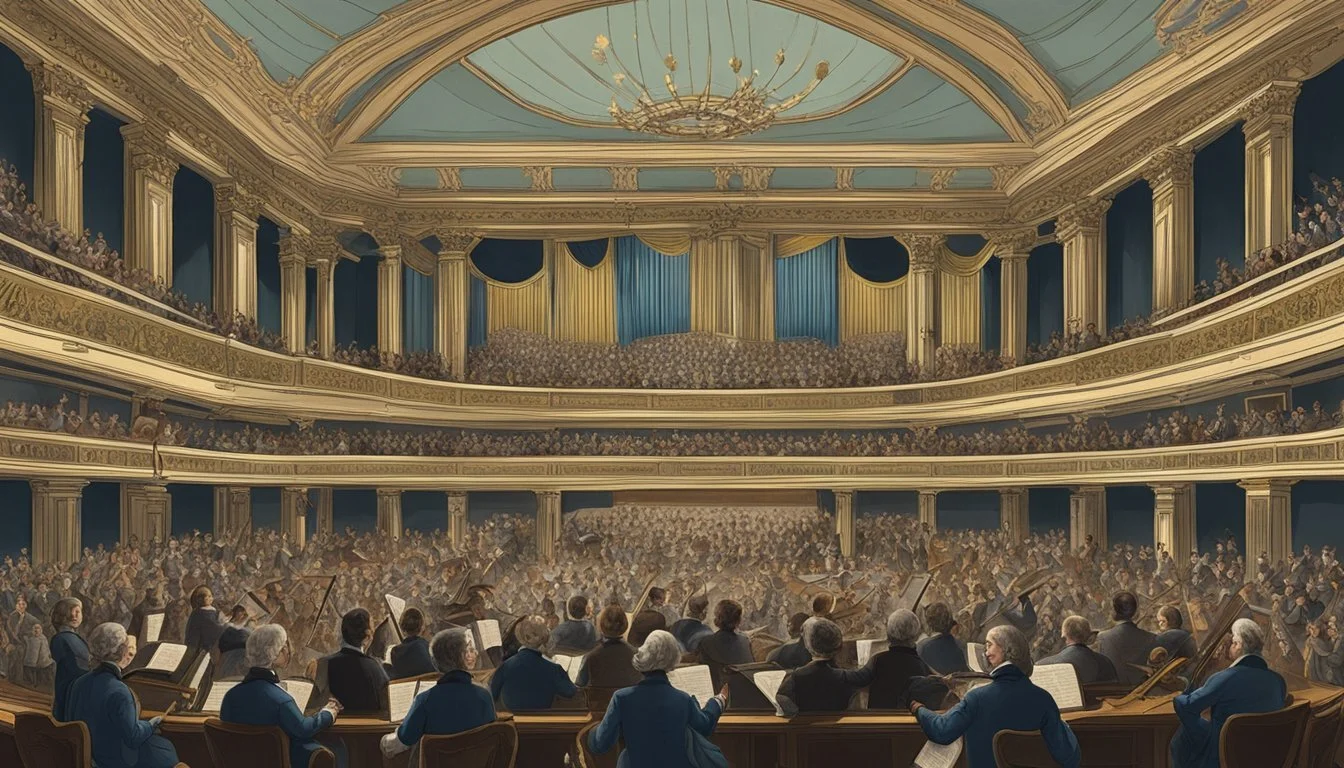Mozart's Rivalry: The Historical Notes Behind 'Amadeus'
Fact vs. Fiction in the Famous Biopic
The rivalry between Wolfgang Amadeus Mozart and Antonio Salieri has captivated audiences for centuries. Popularized by Peter Shaffer's play "Amadeus" and its film adaptation, this tale of musical genius and jealousy has become deeply ingrained in popular culture. While the dramatic portrayal of their relationship is largely fictional, it draws from kernels of truth and historical context.
Mozart and Salieri were indeed contemporaries in 18th-century Vienna, both vying for recognition in the competitive world of court music. Salieri, an accomplished composer in his own right, held prestigious positions at the Habsburg court. Mozart, a prodigy from Salzburg, sought to establish himself in the imperial capital. Their paths crossed professionally, but evidence of a bitter personal rivalry is scarce.
The myth of Salieri's murderous envy toward Mozart originated in Alexander Pushkin's 1830 play "Mozart and Salieri." This work of fiction, written years after both composers' deaths, laid the foundation for later dramatizations. Shaffer's "Amadeus" expanded on this theme, creating a compelling narrative of artistic conflict and human frailty that resonated with audiences worldwide.
Origins of a Rivalry
The historical roots of the Mozart-Salieri rivalry stem from their overlapping careers in Vienna's competitive musical scene. Both composers sought recognition and patronage in the Imperial court, leading to professional tensions.
Wolfgang Amadeus Mozart
Mozart arrived in Vienna in 1781, quickly gaining attention for his prodigious talent. His operas and instrumental works showcased extraordinary musical abilities. Mozart's confidence and unconventional personality sometimes clashed with court etiquette.
He struggled financially despite his genius, often relying on commissions and teaching to make ends meet. Mozart's innovative compositions challenged musical norms of the time.
Antonio Salieri
Salieri, born in 1750, established himself as a respected composer in Vienna before Mozart's arrival. He held the prestigious position of court composer to Emperor Joseph II.
Salieri's works were well-received, particularly his operas. He was known for his teaching abilities and had many notable students. Unlike Mozart, Salieri was adept at navigating court politics.
His conservative musical style aligned with popular tastes of the era.
The Viennese Musical Scene
Vienna in the late 18th century was a hub of musical activity. Composers competed for aristocratic patronage and public attention. The Imperial court played a significant role in shaping musical trends.
Opera was particularly popular, with Italian styles dominating. Concert halls and salons provided venues for instrumental performances. Rivalries between composers were common, often fueled by limited opportunities and resources.
The Viennese audience's tastes influenced compositional styles and career trajectories. Mozart and Salieri's paths frequently crossed in this competitive environment.
Clash of Composers at the Court
The imperial court of Vienna became the stage for a rivalry between Mozart and Salieri. Both composers vied for the favor of Emperor Joseph II, seeking patronage and recognition for their musical talents.
Service to Emperor Joseph II
Antonio Salieri held the coveted position of Court Composer to Emperor Joseph II. This role granted him significant influence and prestige within the Viennese musical scene. Salieri composed operas, chamber music, and sacred works for imperial events and celebrations.
Wolfgang Amadeus Mozart, despite his prodigious talent, struggled to secure a permanent position at court. He worked as a freelance musician, taking on commissions and performing for nobility. Mozart's attempts to gain the emperor's favor often met with mixed results.
The Battle for Patronage
Competition for patronage was fierce in 18th-century Vienna. Mozart and Salieri both sought the financial support and artistic opportunities that came with imperial backing. Salieri's established position gave him an advantage, while Mozart relied on his innovative compositions to make an impact.
Mozart's operas, such as "The Marriage of Figaro" and "Don Giovanni," garnered critical acclaim but faced political obstacles at court. Salieri, adept at navigating court politics, maintained his influence despite the growing popularity of Mozart's works.
Comparing Musical Styles
Salieri's compositions adhered to the traditional Italian opera style favored by the Viennese court. His works were characterized by their accessible melodies and adherence to established forms. This approach aligned well with Emperor Joseph II's taste for straightforward, comprehensible music.
Mozart's music pushed boundaries, blending various styles and introducing complex harmonies. His operas featured intricate ensembles and innovative orchestrations. While some courtiers appreciated Mozart's genius, others found his works too complicated.
The contrast in their musical approaches fueled the rivalry between the two composers. Salieri's conservative style clashed with Mozart's revolutionary ideas, creating a musical and personal tension that would be dramatized in later works of fiction.
Key Operatic Contributions
Mozart and Salieri both made significant contributions to opera during their careers. Their works shaped the development of the art form and continue to be performed today.
Mozart's Masterpieces
Mozart composed several operas that are considered masterpieces of the genre. "The Marriage of Figaro" premiered in 1786 and revolutionized opera buffa with its complex characters and intricate plot.
"Don Giovanni" followed in 1787, blending comedy and tragedy in a morality tale about a notorious seducer. The opera's dramatic finale remains one of the most powerful scenes in the repertoire.
"Cosí fan tutte" debuted in 1790, showcasing Mozart's gift for ensemble writing and witty social commentary. His final opera, "The Magic Flute," premiered in 1791. This Singspiel combined fairy tale elements with Masonic symbolism and featured some of Mozart's most beloved arias.
Salieri's Stage Works
Antonio Salieri was a prolific opera composer in his own right. He wrote over 40 operas during his career, though few are regularly performed today.
His most successful work was "Tarare," which premiered in 1787. The opera's innovative structure and political themes made it popular with audiences across Europe.
Salieri's "Axur, re d'Ormus" was another notable success. First performed in 1788, it became the most frequently staged opera in Vienna during the 1780s and 1790s.
Other important Salieri operas include "Armida" (1771), "La scuola de' gelosi" (1778), and "Les Danaïdes" (1784). While less well-known than Mozart's works, these operas demonstrate Salieri's skill in dramatic composition and vocal writing.
From Stage to Screen: 'Amadeus'
Peter Shaffer's play 'Amadeus' captivated audiences before being adapted into an award-winning film. The transition from stage to screen brought new dimensions to the dramatized rivalry between Mozart and Salieri.
Peter Shaffer's Play
'Amadeus' debuted at the National Theatre in London in 1979. Shaffer's drama explored the fictionalized relationship between Wolfgang Amadeus Mozart and Antonio Salieri. The play's success led to productions worldwide, including a celebrated run on Broadway.
Shaffer's work blended historical figures with creative liberties. It portrayed Salieri as a mediocre composer consumed by jealousy of Mozart's genius. This interpretation sparked debates about artistic license in historical dramas.
The play's innovative structure, with Salieri as narrator, allowed for a unique perspective on Mozart's life and music.
Miloš Forman's Film Adaptation
In 1984, Czech-American director Miloš Forman brought 'Amadeus' to the big screen. Shaffer adapted his own play for the screenplay, expanding the narrative for film.
Forman's vision included lavish period sets and costumes. The film starred F. Murray Abraham as Salieri and Tom Hulce as Mozart. It featured extensive use of Mozart's music, bringing his compositions to a wider audience.
The film's visual style and performances added depth to the theatrical version. Forman's direction emphasized the contrast between Salieri's restraint and Mozart's exuberance.
Impact and Legacy of the Film
'Amadeus' achieved both critical and commercial success. It won eight Academy Awards, including Best Picture and Best Director for Forman. The film's popularity reignited interest in classical music and Mozart's works.
Despite historical inaccuracies, 'Amadeus' left a lasting cultural impact. It shaped public perception of Mozart and Salieri for decades. The film's portrayal of artistic genius and envy resonated with audiences beyond classical music enthusiasts.
'Amadeus' remains a benchmark for period dramas and biopics. Its influence extends to discussions about the nature of talent and the price of greatness in the arts.
Cultural and Historical Accuracy
The film "Amadeus" took significant creative liberties with historical facts. While entertaining, it perpetuated several myths about Mozart's life and relationship with Salieri.
The Myth of Jealousy and Poisoning
Mozart and Salieri were not bitter rivals as portrayed in "Amadeus". Historical evidence suggests they had a cordial professional relationship. Salieri even tutored Mozart's son after his death.
The poisoning accusation was a fabrication. Mozart likely died from kidney failure or rheumatic fever. Salieri's alleged deathbed confession never occurred.
These dramatic elements stemmed from artistic license rather than historical fact. They served the film's narrative but distorted the composers' real lives.
Scholarly Interpretations
Music historians have debunked many of the film's claims. Mozart was not a childish buffoon, but a hardworking professional. Salieri was not mediocre, but a respected and successful composer in his own right.
Scholars emphasize Mozart's financial struggles stemmed from economic factors, not sabotage. His burial in a common grave was standard practice, not a sign of poverty or neglect.
Recent research highlights Mozart's business acumen and Salieri's genuine admiration for his work. This paints a more nuanced picture of their relationship.
Influence of Pushkin and Rimsky-Korsakov
Alexander Pushkin's 1830 play "Mozart and Salieri" heavily influenced the film's narrative. It popularized the myth of their rivalry and Salieri's jealousy.
Rimsky-Korsakov's 1897 opera based on Pushkin's work further cemented these ideas in popular culture. These artistic interpretations shaped public perception for decades.
"Amadeus" drew from these dramatic traditions rather than historical records. It prioritized storytelling over accuracy, creating a compelling but largely fictional account of Mozart's life.
Musical Legacy and Influence
Mozart's musical legacy extends far beyond his lifetime, shaping the course of classical music and inspiring generations of composers. His rivalry with Salieri, while exaggerated in popular culture, played a role in their mutual artistic development.
Mozart's Influence on His Contemporaries
Mozart's innovative compositions set new standards in opera, symphonies, and chamber music. His works inspired many of his peers and successors, including Beethoven and Schubert. Beethoven, in particular, studied Mozart's techniques and built upon them in his own compositions.
Mozart's operas revolutionized the genre, blending complex musical structures with compelling storytelling. His symphonies showcased a mastery of form and orchestration that influenced composers well into the 19th century.
Franz Liszt, though born after Mozart's death, arranged many of Mozart's works for piano, helping to popularize them in the Romantic era.
Salieri's Role as a Mentor
Despite popular portrayals, Antonio Salieri was a respected Italian composer and teacher. He mentored many notable musicians, including Beethoven, Schubert, and Liszt. Salieri's teaching methods emphasized traditional Italian vocal techniques and compositional structures.
His role as Imperial Kapellmeister in Vienna placed him in a position to influence the musical landscape of the city. Salieri's operas were popular during his lifetime, though they have since been overshadowed by Mozart's works.
Salieri recognized Mozart's genius and reportedly praised his compositions, contrary to the myth of intense rivalry popularized by later works of fiction.
Rivalry as Inspiration
The perceived rivalry between Mozart and Salieri, while largely exaggerated, did spark creative output from both composers. Competition in Vienna's musical scene was fierce, pushing composers to innovate and excel.
Mozart's opera "The Magic Flute" and Salieri's "La cifra" premiered in the same year, showcasing their different styles. This artistic "rivalry" contributed to the rich musical landscape of late 18th-century Vienna.
The myth of their rivalry has inspired numerous works of art, including Pushkin's play "Mozart and Salieri" and the film "Amadeus". These depictions, while historically inaccurate, have kept both composers in the public consciousness.
Modern Reception and Interpretation
The rivalry between Mozart and Salieri continues to captivate audiences today. New research and performances have reshaped public perception of both composers, while Mozart's music remains as popular as ever.
Reassessing Salieri's Reputation
Antonio Salieri's image has undergone significant rehabilitation in recent years. Historians and musicologists have challenged the portrayal of Salieri as a mediocre, jealous rival to Mozart's genius.
New evidence suggests Salieri was a respected composer and teacher in his own right. His works have been rediscovered and performed more frequently, revealing his talent and influence on Viennese musical society.
Cecilia Bartoli, the renowned mezzo-soprano, has championed Salieri's music through acclaimed recordings and performances. Her efforts have helped introduce audiences to Salieri's operatic works and vocal compositions.
Mozart's Enduring Popularity
Wolfgang Amadeus Mozart's music continues to resonate with modern listeners. His compositions are regularly performed in concert halls worldwide and remain staples of classical music programming.
Mozart's operas like "The Magic Flute" and "Don Giovanni" are frequently staged by major opera companies. His symphonies and concertos are popular choices for orchestras and soloists.
The composer's life story continues to fascinate the public. Numerous biographies, documentaries, and fictional works explore Mozart's genius and his impact on Western music.
Performances and Recordings
Modern interpretations of Mozart's works range from historically informed performances to innovative contemporary approaches. Period instrument ensembles aim to recreate the sound of Mozart's era.
Major orchestras and conductors regularly record Mozart's complete symphonies and concertos. These recordings offer new insights into familiar works through different interpretations and recording techniques.
Mozart's chamber music and solo piano works are popular choices for intimate recitals and recordings. Young musicians often tackle Mozart's compositions as part of their musical education and development.







